Welcome to thoughtful, organic beauty
Hello Joyous is an organic, plant-based, sustainable beauty brand here to bring more joy to your day.
I’ve been a tea drinker for as long as I can remember—I think it was in my teens when I started drinking green tea (I loved the energy boost I got from it, plus the antioxidant benefits for skin health). However, back then I had no idea what to look for on a package label or what might be hiding in my cup that wasn’t even written on the label.
Then there was a tea shop that popped up in my neighbourhood that had really interesting flavours and unique tea combinations. I thought I hit the jackpot, but what I didn’t know is that these unique flavours were the furthest thing from natural and what I was consuming was just full of chemicals not designed with health in mind but to mimic flavours like bubblegum and cotton candy.

As a nutritionist and a mama of a tea-drinking 4-year-old (the apple doesn’t fall far from the tree) I’m hyper-aware of the microplastics, petrochemical-based dyes and flavouring that can be hidden in tea.
Unless you’re reading all your labels thoroughly, and buying from a trusted brand, then you don’t know what you’re gonna get.
And sadly, there can be hidden ingredients not listed on the package label—ugh!
I don’t know about you but slurping on billions of plastic pieces that are potentially nano-sized (which means they can penetrate your cell membrane) is NOT ideal, and no amount of antioxidants will mitigate the negative effects of these potentially DNA-altering and hormone-disrupting ingredients.
Canadians drink nearly 10 billion cups of tea per year, so if you’re wondering what else might be in that cup then read on...
7 ingredients you don’t want in your cup of tea
1. Artificial flavours and colours
When an “artificial flavour” or “natural flavour” is listed as an ingredient, you actually can’t be sure what the manufacturer used to create their unique flavour blend. The reality is that chemicals used to mimic the flavour of foods found in nature can contain more than 100 chemicals from solvents, emulsifiers, flavour modifiers to preservatives.
When it comes to “natural” flavours, it really comes down to what a company deems as “safe.” I’m not against “natural” flavours per se, but I do my research to understand if it’s a company I trust to create natural flavours. That being said, most of the food we buy and eat does NOT have any added flavour. But many natural health brands that I trust such as Love Child Organics or Genuine Health do have some natural flavouring and zero artificial flavouring. I have asked each of these companies about their natural flavouring and they have a company policy that prohibits certain substances they will not put in their products. This makes me feel confident that my protein powder doesn’t come with a side of petrochemicals and GMO ingredients.
The bottom line is that adding “flavours” to food can be a wild card. You have NO idea what that flavour is made of and most companies are unwilling to disclose this information because it’s usually proprietary.
2. Food colouring
Colouring chemicals are also a wild card especially when you consider these have not been adequately studied for safety. The large majority of colouring products in food today come from petrochemical-based chemicals (by-products of oil refining—gross) and not something you want to put in your body or your little one’s body.
The European Union prohibits many food additives that have been linked to cancer, but these same additives are still used by food manufacturers in Canada and the U.S. Does it make you want to throw your hands up in the air and say “WTF?!” Me too!
Red 40, Yellow 5 and Yellow 6 are some of the most common food dyes that are approved for use in Canada and the U.S. Numerous studies have found dyes have been proven to trigger hyperactivity and ADHD in kids.
This is an example of ingredients from a bestselling tea from a popular tea brand. 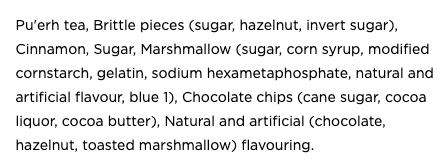
There are many ingredients I would avoid in this tea. To compare, here’s an example of a best-selling tea from Joyous Health: RISE AND SHINE.
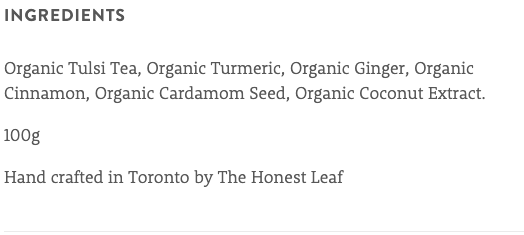
You’ve got nothing to worry about.
The bottom line is I recommend you avoid food colouring in food and drinks by reading your labels.
3. Sweeteners: Artificial and Natural

Okay, I love some honey or maple syrup in my tea latte but a mix of refined sugar plus aspartame—no thank you! When I add natural sweeteners in my tea, I’m the one in control of it. This is why I avoid tea brands that add sugar altogether.
Artificial sweeteners such as aspartame, sucralose (and the like) have a long and controversial history. Here’s the Cole’s Notes version on artificial sweeteners:
Refined sugars, on the other hand, are a little better than artificial (but not by much). They have been linked to several negative long-term health issues including weight gain, reduced immunity and sugar addiction.
Find out what my favourite natural sweeteners are here.
4. Microplastics
This is a dirty little secret of the tea industry—microplastics. Would you like your cup of tea with a side of plastic? Probably not.
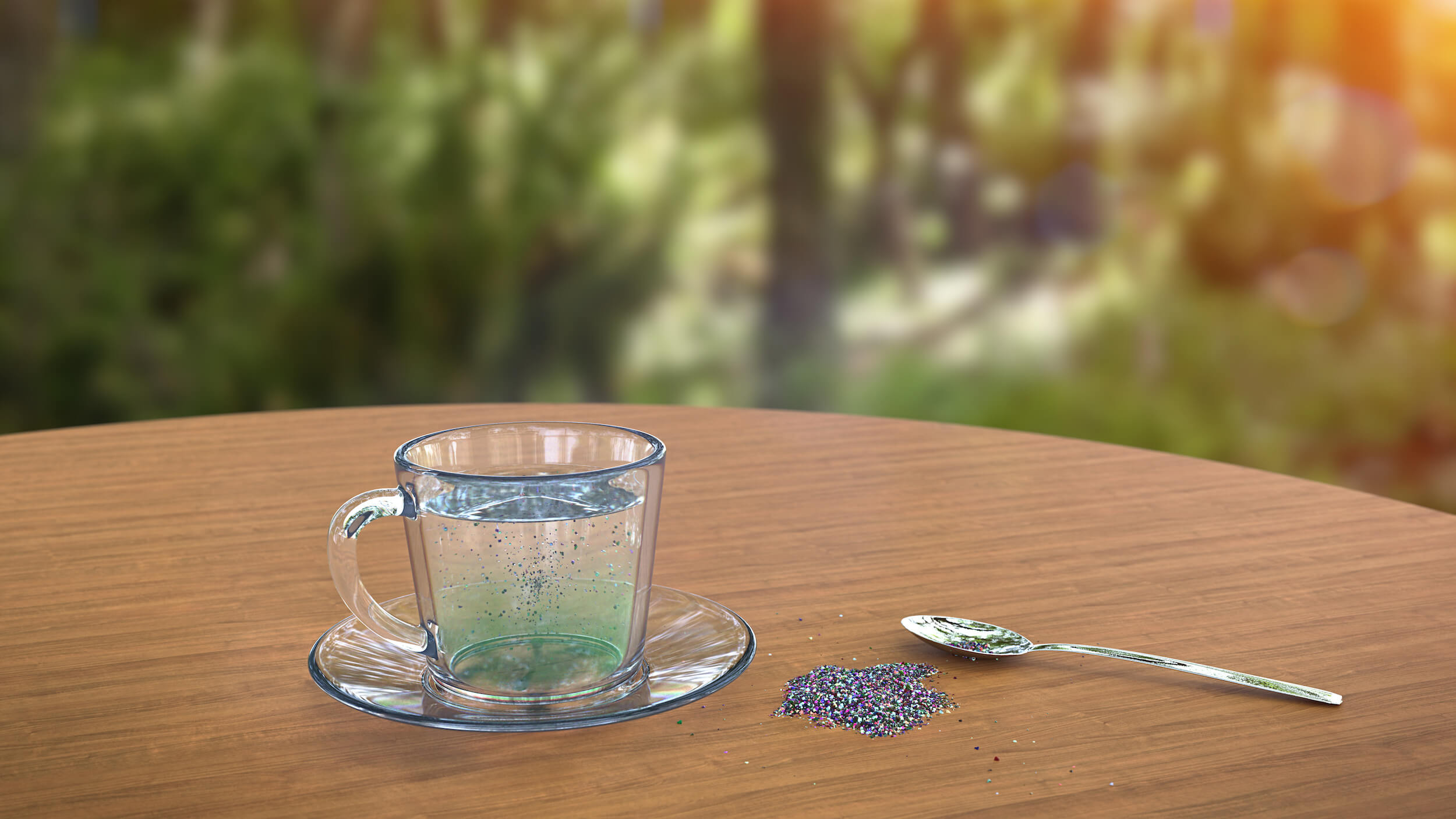
You may very well be swallowing billions of plastic particles in that premium cup of tea if the tea bag is made of plastic.
Microplastics are a real problem, both for the environment and human health. It’s still early to know what long-term effects are but plastic molecules have no place in the human body.
A recent study published in the journal of Environmental Science and Technology found premium tea brands that package their teas in large, silk-like bags actually break down when infused in hot water. In fact, they found that a single plastic tea bag released approximately 11.6 billion microplastics and 3.1 billion nano plastics into one cup. Plastic molecules are hormone-disrupting ingredients and nano-size, which means they can actually get inside your cell—this is terrifying.
Solution: Don’t buy any brand that use silk-like tea bags. The researchers in this study did not release which tea companies do this but if you’re not sure, don't buy it or simply buy loose leaf tea which is what all our organic teas are. There’s less waste and no concern of microplastics.
5. Bleach & Epichlorohydrin
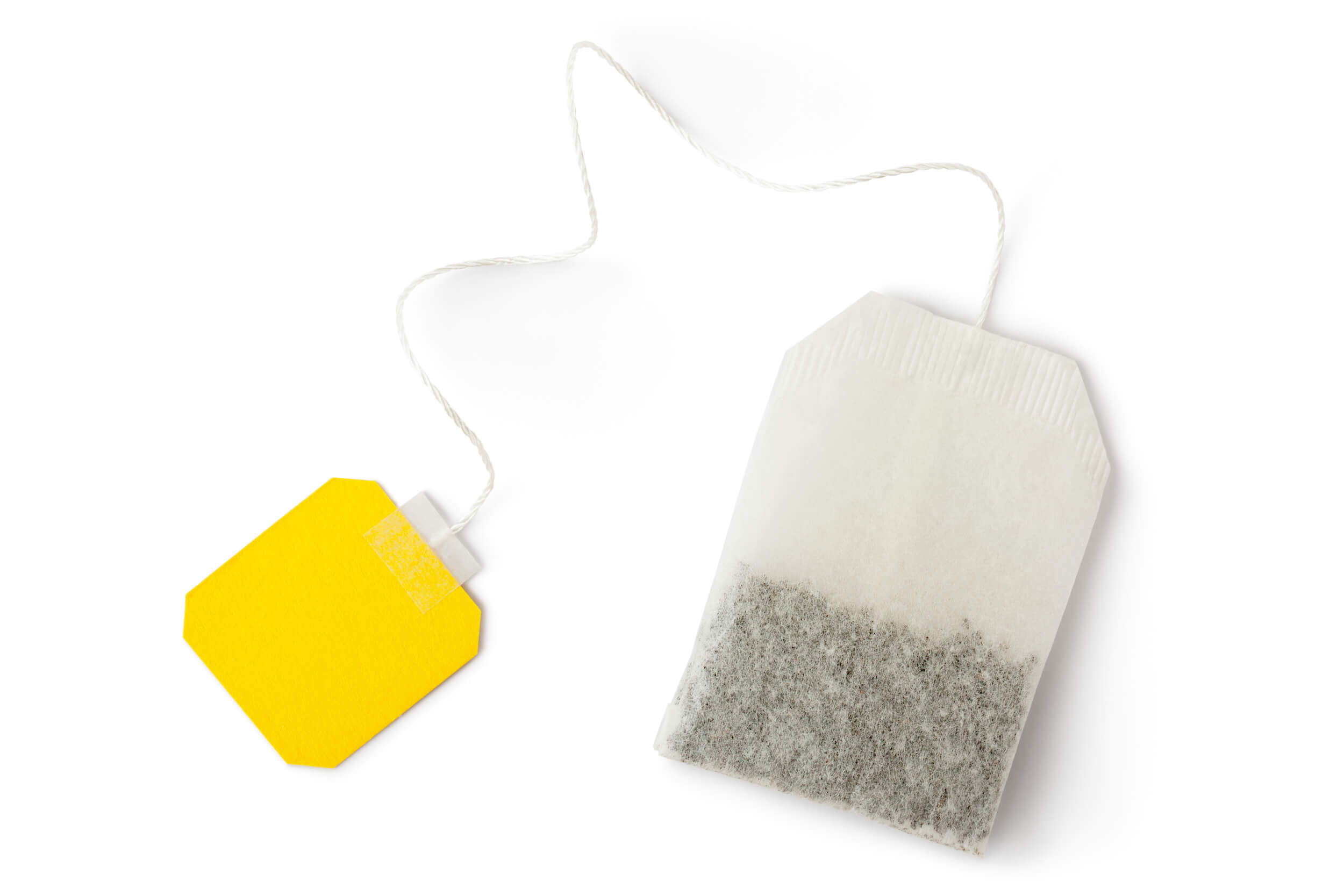
Similar to microplastics, another ingredient not listed on the label is bleach. Many companies use chlorine-bleached tea bags which can be contaminated with dioxins (carcinogenic) and epichlorohydrin. The latter is a chemical considered to provide "wet strength" so the tea bag doesn’t break when steeped in hot water. It is also considered a probable carcinogen by the EPA. However, I’ve used non-bleached “epichlorohydrin-free” tea bags before and they didn’t break.
6. Pesticides
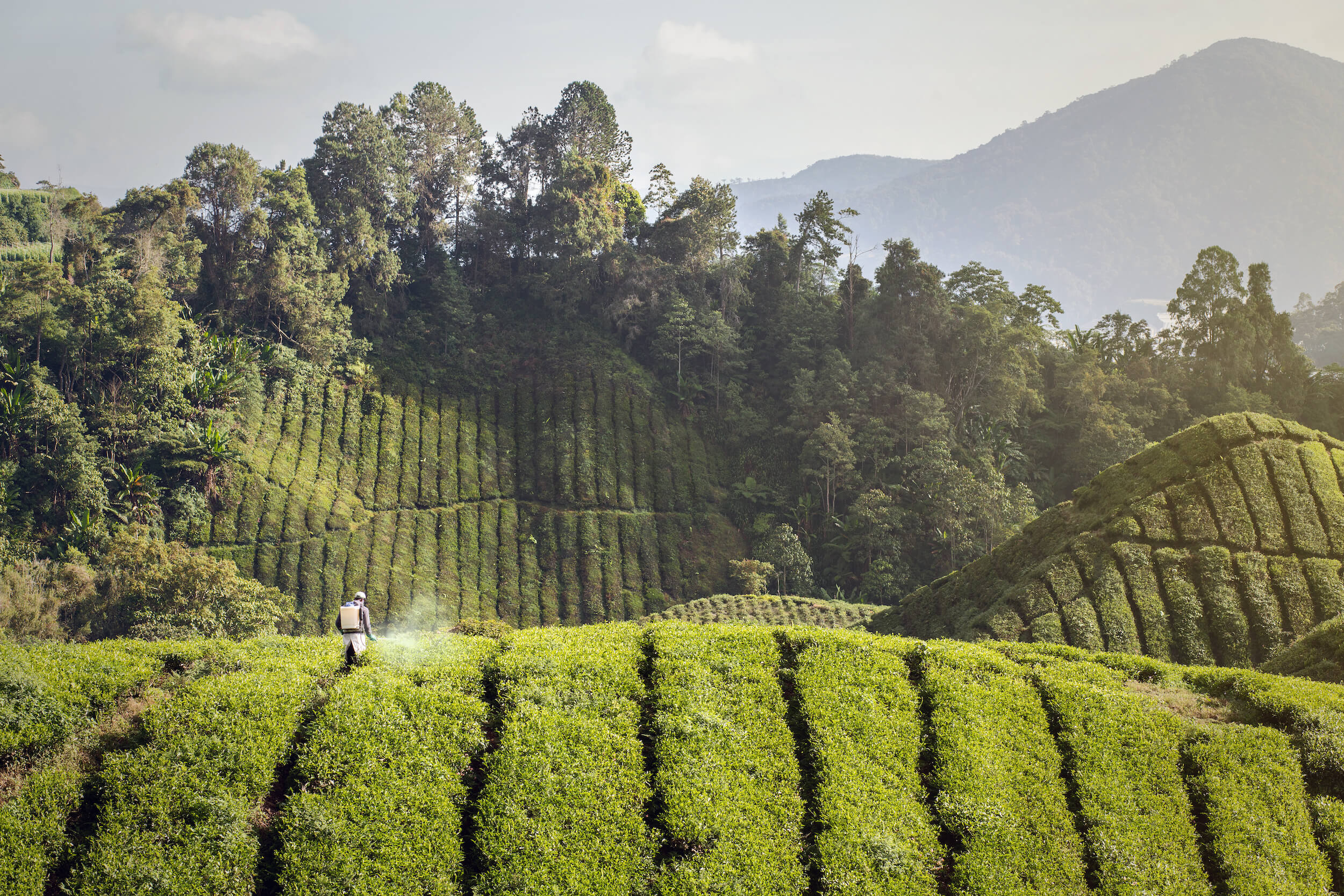
Pesticides, a chemical similar to microplastics (because you can’t actually see it, or taste it), are another big concern. Unfortunately, if you’re purchasing non-organic teas, you may be getting a dose of carcinogenic chemicals especially if that tea is from China.
In fact, Green Peace evaluated pesticides in 18 different tea brands and every single one of them contained at least three different pesticides. Illegal pesticides were also found on some of the tea brands. This is pretty alarming considering that many of the big brands source their tea from China.
CBC Marketplace tested some popular brands: Lipton, Red Rose, Tetley and Twinnings and guess what? Half of the teas tested contained pesticide residues above the allowable limit in Canada. Some of these pesticides are actually banned for use.
8 of the 10 brands tested contained multiple chemicals with 1 brand containing 22 different pesticides.
Health Canada reviewed the information provided by Marketplace and determined that pesticides including bifenthrin, imidacloprid, acetamiprid, chlorfenapyr, pyridaben, acephate, dicofol and monocrotophos did not pose a health risk—things that make you go “hmmm.” My advice: Drink tea with organic ingredients. And yes, every single ingredient in my three teas are organic.
7. Misc. Food Additives
There is a huge array of food additives beyond what I’ve already mentioned but this post will never get published if I don’t stop somewhere. So let’s pick on the additive in that tea ingredient list mentioned above from a very popular premium tea brand in Canada and U.S.: sodium hexametaphosphate.
What is it? It acts as an emulsifier, thickener and texturizer in a variety of foods. It’s corrosive, so don’t get it on your skin. Now, of course, your skin won’t dissolve if you spill this tea on your hand because the amount in a cup of tea is likely very low. But, what if you drink this tea every day? And you eat other processed foods with food additives as well? It’s the accumulation of these toxins from a variety of food sources to beauty products that add up to make a toxic dose.
My advice is simple: Avoid tea brands that have ingredients you don't recognize as food. Simple, right?

I hope you found this information insightful and it influences what tea you purchase going forward. If you have any questions on specific teas I would recommend you contact the company to ask them directly as many companies do not disclose everything on their website and definitely not on the package label.
Joy xo
Wow! This is scary... good to know. Thank you Joy!
ReplyYou're welcome!
I love tea and had no idea it could be so complicated! Are there certain brands of tea you Trust and can recommend ?
ReplyYes I love The Honest Leaf. She makes all my teas in the shop and she also has a wide variety of teas.
Check out the Joyous Teas here:https://www.joyoushealth.com/shop?&productcatid=13
Check out The Honest Leaf teas here: https://www.honestleaf.com/
Sloane Teas are another good brand and same with Pluck -- those are all brands I trust.
This information is so important. I recently listened to the CBC podcast and they had an excellent break down of the microplastic tea bag problem. I am very picky with my teas now. I enjoy your Rise and Shine tea, and I just received the Detox tea today, so I'm excited to try it! Thank you!
ReplyI heard that one too! That's what initially inspired me to write this and do more research on this topic. Enjoy my teas! Definitely check out The Honest Leaf as well for more high quality teas :) She makes all my teas for me.
Hi Joy-thank you for this.I have your tea which I love. I also drink Traditional Medicinal teas- any comments on those?
ReplyI really like Traditional Medicinals. Their tea bags are made of hemp but it looks like their tea wrapper is not recyclable or compostable. That being said, they are far better than the large majority of brands out there and they do not use any flavouring.
Wow! I didn't know about a few things! Thank you!
ReplyThank you Joy. I drink green tea everyday and much of this information is news to me. What brands of tea bags do you recommend? I use David’s Tea and they “look” unbleached.
ReplyI don't use tea bags with loose leaf tea, I use a tea strainer. However, I have bought those unbleached bags in the past. They seem to be good but I don't know if they are treated with any chemicals to improve wet strength, you'd have to ask them.
I love my earl grey. Any brands you recommend?
ReplyYes me too! LOVE LOVE LOVE. My fave Earl Grey is by the Honest Leaf. You can use code "JOY10" for 10% off https://www.honestleaf.com/
Sometimes I feel like the world is out to keep me sick and keep me infertile. It's definitely positive to know there are safe options, but my goodness we live in a scary place. Beautiful too, but scary!
ReplyOh no! Well I think awareness is the first step in feeling more confident in your wellness. I hope that helped you find better tea options for you!
Wow. So eye-opening!! Thank you for sharing and spelling it all out for us.
ReplyYou're very welcome!
Thank you so much,very eye opening. I do love your teas and I have others to that I will look more closely before I make more
ReplyGlad to hear you found it eye-opening!
I am a tea lover with a drawer full of teas including many brands. Very shocking to learn that tea can be one more everyday food item we need to be educated and wary about. So grateful for this information. I would like to bring this information to my women's group and would love to be able to print this information to share with my ladies. Is it possible to get this article in a printed format like your recipes. Grateful reader!!
ReplyHi Karen!
Other than printing off this page or copying and pasting it into a word doc there isn't another way to get this info. I have a special custom-built tool for my recipes that I do not have for my blog posts. Sorry about that!
Thanks for the this great article!! I also share my love of tea with my littles :) Question- what are your thoughts about stevia in tea as part of the ingredients? Is this something to be wary of?
ReplyYou're welcome! I don't mind stevia at all. I think it's really a personal preference.
Okay the micro-plastics is a big thing right now, but from what I've read, it's not just the tea itself we need to worry about, but water too. If we're drinking from the wrong source, there's toxins we could be ingesting there as well, which freaks me right out. As much as we can now, we're drinking spring water from glass containers. If anyone's in Toronto
ReplyAgreed, I would definitely not drink water from any plastic source even if it's BPA free. But yes unfortunately for many reasons there are microplastics even in our water and there is no way to remove it.
That’s why I only drink your tea, besides being delicious, Just makes sense and then I don’t have to wonder what’s in my tea! Win -Win !
ReplyAmazing! So happy to hear that Diane!
Hi I thought this article was very interesting and I'm now going to look into these ingredients in my cuppa, I have brain injury, suffer with headaches alot due to my illness and need to clear my brain fog, thankyou kind regards Michelle
Reply